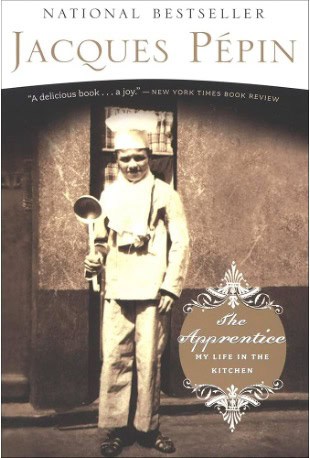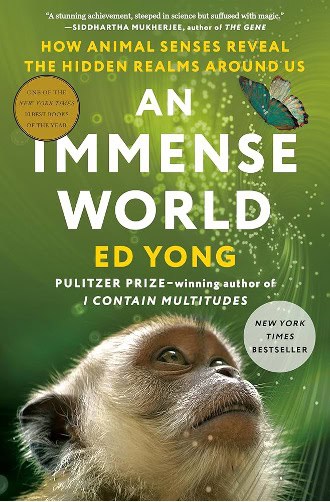
The Apprentice: My Life in the Kitchen
by Jacques Pépin
“More than anything in the world, I wanted to be a chef.”
Decades ago, I, along with many, many other people, was enamored with the iconic television cooking shows: Julia Child’s The French Chef, Jeff Smith’s The Frugal Gourmet, Graham Kerr’s Galloping Gourmet and Jacques Pépin’s The Complete Pépin and Fast Food My Way. Craig Clairborne, James Beard, and Julia Child were all close friends with Jacques before they all became famous. Julia Child called Jacques “the best chef in America.” Pépin, who died last year, eventually became an Emmy Award-winning celebrity who taught Americans how to cook via his television shows and cookbooks. This engrossing memoir details chef extraordinaire, Jacques Pépin’s life.
The narrative opens with Jacques as an impoverished 6-year-old boy, working in exchange for food during World War II in a rural community in France. Since his father, a Resistance fighter, was captured by the Germans, his mother and his siblings were the “bread winners.” Later he worked in his mother’s cafe where he learned how to improvise with the available food sources. In 1949, at 14 years old, Pépin entered an apprenticeship of three years with Le Grand Hôtel de l’Europe in Bourg-en-Bresse, where he learned a highly exacting system of brigade de cuisine, traditional “Old World” cooking and training where aspiring chefs spend years learning about everything kitchen related. He began his apprenticeship as a cleaner, not of food, but of kitchens! Finally, after a year he was allowed to begin his cooking training in an “Old World” kitchen. Eventually he was hired to work at a legendary Parisian restaurant. He then became Charles de Gaulle’s personal chef. Afterwards he went to the U.S. where he declined a position as John F. Kennedy’s chef in order to work at Howard Johnson’s.
In 1974, Pépin was in a devastating car accident which led to a terrible prognosis. He was advised he may never walk again. Ever determined and creative, he decided to teach. He wanted to share the classical techniques he learned through the years of his experience. However, he wanted to simplify the complex techniques, make the recipes easier for American cooks, and use local seasonal products. This was such a joy to read. I was so impressed by Jacques’s resolve and accomplishments. It’s a charming memoir and even non-cooks will enjoy it.

An Immense
by Ed Yong
I was awed after reading the wondrous An Immense World, and completely changed my opinion regarding different non-human species’ sensory abilities. As the author explains, many beings in the animal kingdom have greater capabilities in areas we aren’t aware of and/or don’t understand. The very brilliant and talented Yong, who is a Pulitzer-winning science journalist, writes how basic senses (scent, sight, etc.) act in other species, often beyond our abilities, and discusses species who possess extraordinary capabilities (elephants, octopuses, songbirds, turtles, etc.). This engrossing and illuminating book includes the scientific explanations about how these abilities were discovered and the science behind them.
Humans see color via wave lengths. Many other beings only see weaker light and shorter ultraviolet wave lengths, sometimes using multiple pairs of eyes. For example, some snakes have eyelike structures at the tips of their tails, while octopuses have them distributed along their tentacles, each arm with its own brain. Some animals hear at frequencies we can’t detect, while some detect surface vibrations through their whiskers and antennae. Bats and dolphins use echolocation. Yong explores electric field generation detection by fish, some dolphins, and spiders. Bees sense electric fields around flowers! I was astonished at the ability of beings (salmon, whales, sea turtles, songbirds) to detect the earth’s geomagnetic field and use it to navigate. Whales’ low frequency song is so tuned into the sonic resonances of the ocean that they can be heard by other whales halfway round the world! Migrating turtles and birds detect the Earth’s geomagnetic field and use it as a navigation tool in their travel to other destinations.
Sadly, Yong points out ways in which we humans are disrupting their sensory worlds with noise, excessive light, and other human made stimuli that we’re unaware of. For example, “…the memorial event intended to honor those murdered at New York’s Twin Towers in September 2001. Every year, utilizing 88 xenon bulbs, each with an intensity of 7,000 watts, the organisers fire a so-called Tribute in Light into the night sky, which can be seen from 100 kilometres away. Mid-September happens to be the peak period for migrating birds, and lights of this nature can have a huge impact on the avian navigational process. Across seven nights of its operation, the Tribute in Light has been proven to waylay more than one million birds.” From the National Book Foundation: Ed Yongis a Pulitzer Prize–winning science writer based in Oakland. He is the author of two bestselling books: I Contain Multitudes: The Microbes Within Us and a Grander View of Life, and An Immense World: How Animal Senses Reveal the Hidden Realms Around Us, which won the Andrew Carnegie Medal for Excellence in Nonfiction and the Royal Society Trivedi Science Book Prize. He was a guest editor of the Best American Science and Nature Writing anthology, a Guggenheim Fellow, and is a member of Liminal—a science communication collective, co-founded by his wife Liz Neeley.

2054: A Novel
by Elliot Ackerman and Admiral James Stravridis
Singularity is a theoretical point in human history where technological development grows uncontrollably, leaving the future of humanity uncertain. Not only will machine intelligence outpace human intelligence, but the Singularity will lead to a merger between the two.
2054 begins twenty years after the 2034 novel by the same authors. It is also a riveting political and sci-fi page turner, exploring the most significant geopolitical issues today, such as the potential consequences of emerging technologies including remote gene editing, quantum computing, and most momentously, Singularity, and how they may affect us in the future. The ethical challenges of future technology, just as important, are also examined.
The narrative initially focuses on the U.S. recovery from a devastating nuclear war with its rival, China (the plot of 2034, the first novel in the trilogy – a proposed third book will end the trilogy.). Then suddenly the President of the U.S., who held office for a decade, is assassinated. A cover-up ensues, and people begin to question what’s actually happening amidst disinformation and social media, and start to demand transparency. The possibility of civil war appears on the horizon. Eventually, the country splits into two factions, “Truthers” and “Dreamers.” I assure you dear readers this intriguing, thoughtful book will keep you reading far into the evening. It’s not necessary to read the first in the trilogy, 2034, but ideally it would probably be best.
FYI: A fascinating non-fiction book, The Singularity is Near: When Humans Transcend Biology, by Ray Kurzweil about artificial intelligence and the future of humanity would be a perfect complement to this book. Kurzweil is an inventor and legendary computer scientist.
From Penguin Random House website: Elliot Ackerman is the author of the novels Sheepdogs, Halcyon, 2034 (coauthor), Red Dress in Black and White, Waiting for Eden, Dark at the Crossing, and Green on Blue, as well as the memoirs The Fifth Act: America’s End in Afghanistan and Places and Names: On War, Revolution, and Returning. His books have been nominated for the National Book Award, the Andrew Carnegie Medal in both fiction and nonfiction, and the Dayton Literary Peace Prize. He is a contributing writer at The Atlantic and a Marine veteran who served five tours of duty in Iraq and Afghanistan, where he received the Silver Star, the Bronze Star for Valor, and the Purple Heart.
Admiral James Stavridis, USN (Ret.), spent more than thirty years in the US Navy, rising to the rank of four-star admiral. He was Supreme Allied Commander at NATO and previously commanded US Southern Command, overseeing military operations through Latin America. At sea, he commanded a Navy destroyer, a destroyer squadron, and an aircraft carrier battle group in combat. He holds a PhD from the Fletcher School of Law and Diplomacy at Tufts University, where he recently served five years as dean. He received fifty medals in the course of his military career, including twenty-eight from foreign nations. He has published fifteen other books and is the senior military analyst for CNN and a Bloomberg Opinion weekly columnist. He is currently partner and vice chair, global affairs, of the Carlyle Group and the chair of the board of the Rockefeller Foundation.
Adult book reviews are by Susanne Dominguez.
